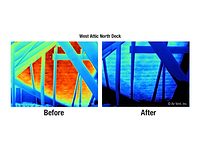Parts of the country seem to be made of metal and one contractor is making the most of it. The products fashioned by Threadgill Sheet Metal Works Inc. in Cypress, Texas, are nearly all metal. The company makes its own panels on a portable roll former, constructs metal buildings, retrofits low-slope roofs, and provides its own warranted roofing system for high-end residential customers.
Pedal to the Metal
From the five-crimp structural panel to the double-lock standing seam profiles, Texas architecture is fond of shielding itself in metal. Even corrugated panels with a Galvalume finish are giving renovated condos a post-modern, industrial look that fetches premium prices. Threadgill Sheet Metal has insulated itself from market downturns with a sheet metal shop that turns out everything from panels to gutters to copper bay windows.One recent project was housing units for the Centerville Public Housing Authority. Threadgill Sheet Metal originally came into contact with the authority back in 1999, when Threadgill Sheet Metal made its first sale off its newly launched Web site. Back then, the authority’s one-story office building had to replace three-tab asphalt shingles and the architect for the job originally specified T-panels. After Wayne Threadgill, company president, visited the Housing Authority Director to compare samples of the T-panel and a double lock, Wayne said that he would provide a superior system for no added cost. He closed the sale and got another call three years later for the 34,000-square-foot housing project, winning the job without even being the low bidder. “They got to see the quality of our work, our product. They had to live with it for a few years,” says Threadgill.
The crews tore off the three-tab asphalt shingles and left as much underlayment in tact as they could to keep the building dry for the duration of the project. After it was discovered that the original decking was only 3/8 inch on three of the buildings, the company got a change order to install 1/2-inch plywood over it and dried in the structure with 30-pound felt. The five double-lock panels were screwed onto the deck with Dynamic Fastener clip screws and 24 gauge concealed cleats. Threadgill likes the smooth attachment the large flat heads provide and considers the double lock seams to be waterproof. The 24-gauge coated steel from Drexel Metals Corporation come with a 30-year Kynar 500 finish. The project was finished in two months and came with Threadgill Sheet Metal’s own five-year warranty on the workmanship.

Coil Up
Threadgill Sheet Metal forms its own standing seam panels from 20’ Drexmet coils; the coils come in 31 colors with Kynar finishes or Drexlume Galvalume Plus. For exposed fastener systems, the company prefers a double underlayment with MBCI structural panels. Over the 30-pound felt a black PVC membrane by Top Guard is installed while an additional water and ice shield is used for valleys and penetrations. Threadgill likes redundancy in the underlayment, which virtually eliminates callbacks. Normally, roofing can shed the rains but Texas has experienced quite a few storms recently, some that have dumped several inches of rain in an hour, flooding streets and overwhelming roofs (Roofing Contractor, Jan. 2003). “Actually, I’ve had several jobs where they specified double underlayments. It’s not uncommon to see that,” says Threadgill. “We get some real bad rains in Texas.”Undergoing Tests
Threadgill purchased his first portable roll former in 1985 and is working with Underwriter’s Laboratories on ratings for his own system: UL-90 for wind uplift, UL-790 for fire and UL-2218 for hail resistance. The latter rating is becoming a requested item in Texas, which suffered several severe hailstorms in the 1990s. When a roofing system passes UL-2218, homeowners can get a discount from their homeowner’s insurance policy. However, the catch is that there will be no payments in cases where the hail damage is cosmetic.“Builders are starting to ask for the 2218,” says Threadgill. “I think it’s going to be more and more important in the coming years to offer 2218. We’re looking toward being a single source of responsibility for a metal roof systems in the area.”
When all of the certifications are in place, Threadgill believes he will be the first manufacturer/installer in the area to offer complete ratings for his own roofing systems. His commitment to the product includes an engineer on retainer and submission to regular UL inspections. “I feel like it will make us a better company,” he says. “It gives us an entree into commercial projects where that’s required. We’ve been gradually increasing the commercial aspect of our business over the last several years.”
When Threadgill took over the business from his father, J.E. “Bugs,” there was not much commercial work being performed. Now the company does about 25 percent commercial. One recent avenue is a new design trend near Houston called the West End Tin Houses movement. His company has already installed 15,000 square feet of corrugated siding on five condos as part of a redevelopment project and the pricey trend is growing.
Top Quality
In addition to the size of the Centerville project, Threadgill was happy to deal with a client that wanted a quality roofing system. This Texas boy with a Master’s in general psychology still sees a lot of shoddy workmanship and he is often called in to fix a project that went bad. One time he got a call from a homeowner who ordered himself $15,000 worth of copper in a snap-lock profile that Threadgill refused to install because the winds would uninstall it just as quickly. The irony of customers going cheap on a metal roof doesn’t amaze him any longer. “They think they’re going to save money,” says Threadgill. “They want to buy the premium product but pay the 29-gauge price. I’ve learned to cut my losses and get rid of them.”Often he’ll inspect a home’s attic to see panels screwed directly onto staggered boards. Even if the panels shed the rain adequately, Threadgill has seen enough “barn sweat” in Texas to know that condensation on the interior of the panels will seem like a perpetual roof leak. He says that part of the reason for the problems is that Texas is one of 29 states that doesn’t license roofing contractors. The state recently joined the International Building Code, which should better regulate construction. Construction along the more vulnerable coast must carry wind certificates that are certified by engineers. Despite all of the progress, Threadgill says that many parts of Texas remain in the frontier. “It’s the West for one thing,” he explains. “There’s still the gun slinger mentality.”
Threadgill complains that business is slow right now, but to him that means, “We’re just not six weeks behind.” The company’s Web site (www.threadgillsheetmetal.com) is a gold mine that allows them to market products around the country. The company gets a leg up on contractors from Connecticut to California by specializing in products that are fashioned, marketed and serviced with an eye for repeat business.
“Our Web site seems to bring us the kind of work we need when we need it,” says Threadgill. “There’s a whole lot of other people in our business who have no idea what they’re missing.” The site carries numerous examples of projects and products while being very user friendly. There is basic material to educate clients, a sister site (www.classiccopper.com) for specialty products, and a focused effort to market the products above the noise of the World Wide Web. There’s a separate division for retail and wholesale products and the company keeps tabs on the latest trends in e-commerce.
As for the venerable skills needed in his open shop, Threadgill trains everyone in-house and promotes from within. Benefits for the 12 employees are generous, there’s a performance bonus for large projects, and employees can contribute to their annual Christmas bonus. He’s even got four brothers from one family on the work force.
His sheet metal shop is a throwback to the old days where anything that could be fashioned out of metal, was. In a way, Threadgill walks between worlds: philosopher contractor competing with cowboy roofers; industrial panels for high-end uses; venerable material sold on the Internet. He recently published a book, When Only the Moon Rages, which is a collection of science fiction, horror stories and poetry. Kind of like roofing.



